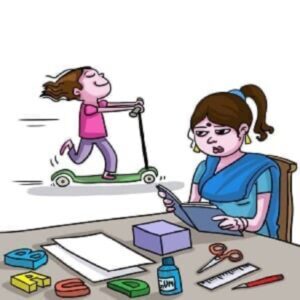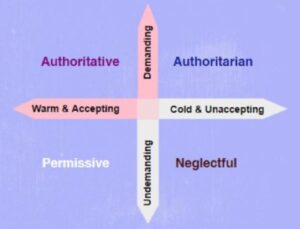How you are towards your children as a parent can affect them for the rest of their lives. There are many different parenting styles. The way a parent responds to their children can have a huge impact on their development. Some parents are very strict and unforgiving. Others are aloof and unaware of what is going on in their children’s lives. Whilst some feel their children are out of their control. There is no perfect parent, but there are ways to ensure your parenting is more effective for the health and wellbeing of your child.
The psychologist Diana Baumrind was the first person to identify different parenting styles. Nowadays there are four identified parenting styles used as a reference in popular psychology.
The 4 Parenting Styles:
- Authoritative
- Authoritarian (or Disciplinarian)
- Permissive (or Indulgent)
- Neglectful (or Uninvolved)
Authoritarian (or Disciplinarian)
The authoritarian parent is very strict. They expect their children to be obedient, to follow commands or orders and there is little room for communication. They tend to be dominating in their approach and a child may feel scared to express themselves to this parent. If the parent feels the child has done something wrong, they will discipline through punishment. Grounding the child, taking something away from them and often withdrawing affection as a part of the punishment.
Important traits of authoritarian parents:
- They do not encourage communication.
- They rely on obedience; children should do as they are told.
- They tend to control their children through shaming, punishments and withdrawing affection.
- They do not communicate the reasons behind rules/punishments etc.
Authoritarian parents usually lack warmth also known as responsiveness. Which is the ability to self-regulate and self-assert to be attuned and supportive to their children’s needs. They usually want to control their kids and are demanding. They expect their children to live up to their standards, to fit in to their ideals and to match the maturity expected of them.
Permissive (or Indulgent)
Permissive parents tend to be very lenient. They may set rules but rarely enforce them. They may threaten punishments but rarely uphold them, and they do not intervene much in their children’s lives. They tend to let the kids do what they want and only get more involved when there is a serious problem.
Important traits of the permissive parent:

- Being nurturing and warm
- being reluctant to impose limits
- Parent plays the role of friend
- Children run the show
Being nurturing and warm is very positive when it comes to raising your kids, but with this style of parenting there is a lack of boundaries. So, this style is high warmth or responsiveness but low control. Parents are often like friends, so kids will be able to talk in a relaxed manner to their parents. But there is little guidance within decision-making or behavioural expectations.
Neglectful (or Uninvolved)
The uninvolved parent is not very aware of what is going on in their children’s lives. They have little awareness of what the child is doing at school, who their friends are, and they may not know where they are or what they are doing in free time. They are not present, and children are raising themselves to some extent. There may be rules, but they are rarely upheld, and they receive little guidance, nurturing, or attention from their parents.
Important traits of the uninvolved parent:

- Show little warmth and affection
- Do not take care of their children’s basic needs
- Are indifferent and distant. They do not provide emotional support
- Show little to no interest in child’s interests, schoolwork etc.
Uninvolved parents do not set many if any boundaries and although they physically present at home, they are far removed from their children’s lives. This style is low warmth/responsiveness and low control.
Authoritative parenting style
We come to the final parenting style- which is the most effective, although this may depend on the culture or society.
The authoritative parenting style combines warmth and sensitivity towards the child but with clear set boundaries and guidelines. Therefore, it is high warmth/responsiveness and high control. Parents guiding their children in this way will be able to listen to their children’s point of view- but will not necessarily accept it. They will explain reasons for rules, or if they feel upset by something. Authoritative parents are emotionally available to their children being supportive and accepting them as independently minded, but they expect respect and maturity from their children.
Important traits of the Authoritative parent:

- Reasonable demands and consistent limits
- Expresses warmth and affection
- Listens to the child’s point of view
- Can compromise with their children where necessary
Authoritative parenting is high warmth/responsiveness combined with high demand/control. Thus, parents expect their children to do well and succeed, but they can express themselves to their parents.
Parenting styles and their impact
We have looked at the different parenting styles. Now we will look at what impact these parenting styles have on kids.

As the Authoritarian parenting style has a strong focus on rules and obedience, children of authoritarian parents will often be very well behaved. It is high control/demandingness but low responsiveness/warmth.
Positive outcomes:
They grow up understanding there are serious consequences for bad behaviour or failure to reach their parent’s expectations. These children are often the best behaved in class, polite to adults, and very goal driven. They learn to follow rules without question. They are likely to pay attention to safety, and not take great risks.
Negative outcomes:
They can become very rule dependent. Without guidelines, they are not able to function at their best. This can have a negative effect on self-esteem as they are unable to make decisions with ease. They may feel insecure with more creative projects or free-thinking because the parenting style does not encourage it. Kids of authoritarian parents may have problems expressing themselves. No one guides them to talk about how they feel, or even have a dialogue about why there are certain expectations.
Thus, they may learn to suppress emotions and close themselves off to feelings. This can cause anxiety and depression in the long run, and angry or aggressive behaviour. Another effect of this parenting style can be that it encourages rebellion. The children want to break free of the constraints and expectations. So, this style can even have the opposite effect to what the parents intend.
These days it is not considered to be the most effective way of parenting. It is good there are high boundaries and high expectations. Unfortunately, the lack of warmth and responsiveness can lead to mental health problems.
The permissive parenting style is highly responsive, but with low control.
Positive outcomes:
Parents listen to their kids and nurture their abilities and interests. Permissive parents often treat their kids as friends. The parents and children usually have a warm and loving relationship. There is usually little conflict- because the child usually gets what they want. They are allowed to express themselves and explore their creativity, they will be able to try out new ideas and be themselves.
Negative outcomes:
As there are few or unclear boundaries children can become insecure. Children need some boundaries to feel safe and secure and to learn how to impose their own limits when they are older. Without limits the desire to keep wanting more can occur. Encouraging ‘spoiled’ behaviour.
At school, this may manifest itself through an inability to socialise appropriately or cause them to bully other kids, as they are used to getting what they want. This paired with a lack of fear of punishment means they don´t worry about this kind of bad behaviour. Later in life this lack of limits can show up as addiction issues or getting into bad habits.
Children of permissive parents often have trouble regulating their emotions. They may have trouble coping with loss or an inability to do as they please, they have not built-up resilience or practised dealing with tougher emotions. They often have trouble following rules and will openly disobey authority figures. Which can show up as doing badly at school as parents have not set strong expectations and they do not necessarily respect authority so they may lack the motivation to achieve.
Neglectful (or uninvolved) parenting has low responsiveness/warmth and low boundaries/control from parents.
Outcomes:
The children of neglectful parents are left a little lost. With very little emotional support and responsiveness from parents, children are likely to become withdrawn emotionally- with an inability to express, explore or understand their emotions. As they lack guidance, they may become anxious or stressed as from a young age.
Parents may not help them with tasks or guide them in how to do things well. They become reliant on themselves or their siblings from a young age. They will often become very self-dependent which means they can have problems forming relationships and trusting others. They may have problems forming attachments and fear being dependent on other people. Children of neglectful parents are more likely to be delinquent from school and are at an increased risk of addiction problems or substance abuse.
This could be considered the worst type of parenting style due to the low level of love and affection (responsiveness) coupled with no boundaries/rules or regulations (control).
Lastly, we come to authoritative parenting, which is the most successful approach to raising healthy, happy kids.
Outcomes:
The authoritative approach combines high responsiveness and warmth with high boundaries/control. It combines the warmth of permissive parenting with the demandingness of authoritarian parenting. Kids understand the boundaries imposed, but there is room for discussion, communication, and emotional responses.
Kids that come from families that use this type of parenting style are more resilient, happy, confident, and respectful. Parents teach them to understand why they should follow the rules. Parents show respect to them which in turn teaches them to be respectful. They usually do better in school as there is an expectation that they work hard, but parents help when needed. They feel comfortable asking for help if necessary.
They are more resilient than other children as they understand that they can learn from mistakes or failure. This gives them the ability to overcome problems in general in life. They learn how to manage emotions, as there are limits put on their behaviour. But they are encouraged to discuss how they feel, and parents will help them problem solve. Parents encourage them to make their own decisions but help them weigh up ideas- so they may become confident leaders.
This is the most celebrated parenting style by psychologists. But kids and teens may go through rebellious phases or try and push boundaries whatever the approach. In this case, it is important for authoritative parents to be consistent and patient in their approach.
Eleanor is a facilitator at Shiminly. She has been teaching for 13 years and loves to help kids open their minds, discover new things, and enjoy the process of learning.








































